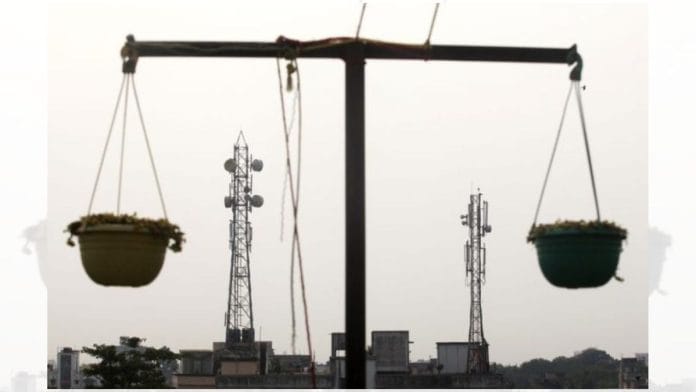New Delhi: Even as the Centre has sought clarification from the Supreme Court on a 2012 verdict in order to be allowed to allocate spectrum administratively — i.e without auction — it is not seeking modification of that order, ThePrint has learnt.
The spectrum for offering mobile services, a senior government official said, would continue to be auctioned and administrative allocation of airwaves would only be done for limited-use cases.
The Centre in its plea to the Supreme Court submitted that if the assignment of spectrum was in pursuit of governmental functions or in public interest or if its auction may not be preferred due to technical or economic reasons, then the government may consider allocating the same through processes that are in accordance with law.
It sought a clarification on the 2012 verdict, arguing that the ruling was delivered without considering such instances and a clarification would help the government firm up its spectrum-assignment framework.
It should be noted that The Telecommunications Act, 2023, which was notified in December last year, paved the way for administrative allocation of spectrum for specific cases, including national security and defence, law enforcement and crime prevention, public broadcasting services, disaster management, research and development, radio backhaul for telecommunication services, in-flight and maritime connectivity and satellite-based services.
“Spectrum for mobile services will continue to be given through the auction process. We are already preparing for the next round of spectrum auction,” the source added.
The Department of Telecommunications is already in the process of conducting the next round of spectrum auctions. The auctions are proposed to be held on 6 June, 2024, after the results of the Lok Sabha polls are announced.
The government will auction all available spectrum in the 800 MHz, 900 MHz, 1,800 MHz, 2,100 MHz, 2,300 MHz, 2,500 MHz, 3,300 MHz, and 26 GHz bands, which at the base price is worth about Rs 96,317 crore.
The source added the government has sought clarification of the judgment as a precaution and “to cover all bases”. The source also emphasised that the application was filed in December last year, before the introduction of the Telecommunications Bill.
Satellite spectrum has been in focus in the past few months, with the industry divided over whether or not spectrum should be allocated administratively. Some major players in the space are Bharti Group-backed OneWeb, Reliance’s Jio Satellite Communications, Elon Musk’s Starlink and Amazon’s Project Kuiper.
The request for the clarification came more than a decade after the Supreme Court set aside the first-come-first serve (FCFS) basis for the assignment of spectrum, and cancelled the 2G spectrum allocation in 2012.
“In our view, a duly publicised auction conducted fairly and impartially is perhaps the best method for discharging this burden and the methods like first-come-first served when used for alienation of natural resources or public property are likely to be misused by unscrupulous people who are only interested in garnering maximum financial benefit and have no respect for the constitutional ethos and values,” the Supreme Court had said.
However, in another judgment in September 2012 — on a presidential reference made to it by the central government — the SC clarified that the 2G verdict was meant only for 2G spectrum allocation and “never intended to be taken as an absolute or blanket statement applicable across all natural resources”.
It clarified that the 2G judgment “specifically evaluated the validity of methods adopted in the distribution of spectrum from September 2007 to March 2008”.
Also read: Spectrum for mobile services will continue to be allocated through auction: Sources






